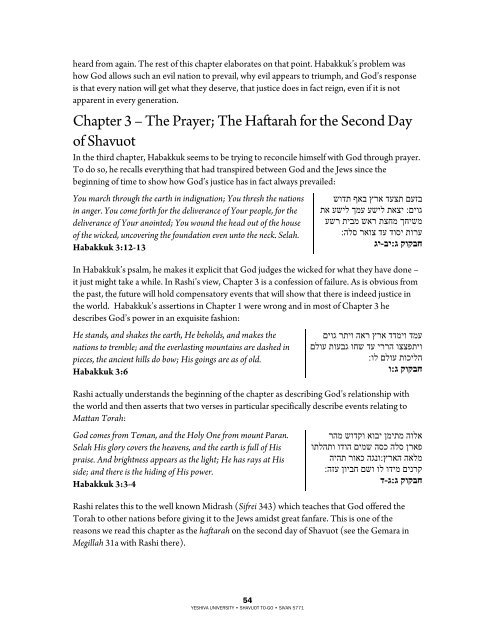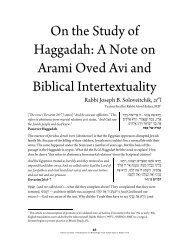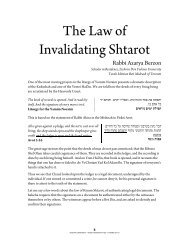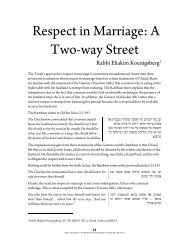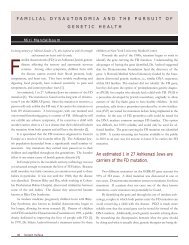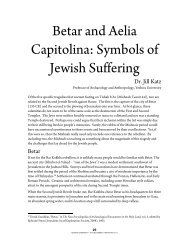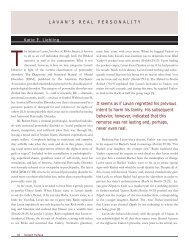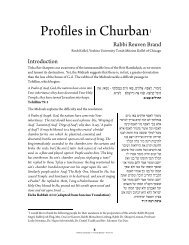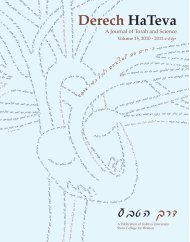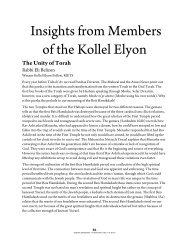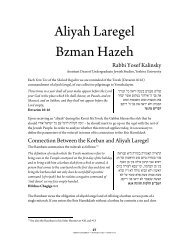Create successful ePaper yourself
Turn your PDF publications into a flip-book with our unique Google optimized e-Paper software.
heard from again. The rest of this chapter elaborates on that point. Habakkuk’s problem was<br />
how God allows such an evil nation to prevail, why evil appears to triumph, and God’s response<br />
is that every nation will get what they deserve, that justice does in fact reign, even if it is not<br />
apparent in every generation.<br />
Chapter 3 – The Prayer; The Haftarah for the Second Day<br />
of Shavuot<br />
In the third chapter, Habakkuk seems to be trying to reconcile himself with God through prayer.<br />
To do so, he recalls everything that had transpired between God and the Jews since the<br />
beginning of time to show how God’s justice has in fact always prevailed:<br />
You march through the earth in indignation; You thresh the nations<br />
in anger. You come forth for the deliverance of Your people, for the<br />
deliverance of Your anointed; You wound the head out of the house<br />
of the wicked, uncovering the foundation even unto the neck. Selah.<br />
Habakkuk 3:12-13<br />
54<br />
YESHIVA UNIVERSITY • SHAVUOT TO-GO • SIVAN 5771<br />
שודת ףאב ץרא דעצת םעזב<br />
תא עשיל ךמע עשיל תאצי : םיוג<br />
עשר תיבמ שאר תצחמ ךחישמ<br />
: הלס ראוצ דע דוסי<br />
תורע<br />
גי-בי:<br />
ג קוקבח<br />
In Habakkuk’s psalm, he makes it explicit that God judges the wicked for what they have done –<br />
it just might take a while. In Rashi’s view, Chapter 3 is a confession of failure. As is obvious from<br />
the past, the future will hold compensatory events that will show that there is indeed justice in<br />
the world. Habakkuk’s assertions in Chapter 1 were wrong and in most of Chapter 3 he<br />
describes God’s power in an exquisite fashion:<br />
He stands, and shakes the earth, He beholds, and makes the<br />
nations to tremble; and the everlasting mountains are dashed in<br />
pieces, the ancient hills do bow; His goings are as of old.<br />
Habakkuk 3:6<br />
םיוג רתיו האר ץרא דדמיו דמע<br />
םלוע תועבג וחש דע יררה וצצפתיו<br />
: ול םלוע תוכילה<br />
ו:<br />
ג קוקבח<br />
Rashi actually understands the beginning of the chapter as describing God’s relationship with<br />
the world and then asserts that two verses in particular specifically describe events relating to<br />
Mattan Torah:<br />
God comes from Teman, and the Holy One from mount Paran.<br />
Selah His glory covers the heavens, and the earth is full of His<br />
praise. And brightness appears as the light; He has rays at His<br />
side; and there is the hiding of His power.<br />
Habakkuk 3:3-4<br />
רהמ שודקו אובי ןמיתמ הולא<br />
ותלהתו ודוה םימש הסכ הלס ןראפ<br />
היהת רואכ הגנו:<br />
ץראה האלמ<br />
: הזע ןויבח םשו ול ודימ םינרק<br />
ד-ג:<br />
ג קוקבח<br />
Rashi relates this to the well known Midrash (Sifrei 343) which teaches that God offered the<br />
Torah to other nations before giving it to the Jews amidst great fanfare. This is one of the<br />
reasons we read this chapter as the haftarah on the second day of Shavuot (see the Gemara in<br />
Megillah 31a with Rashi there).


